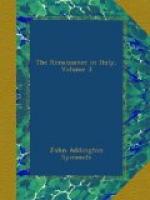The religious phase in Cellini’s history requires some special comment, since it is precisely at this point that he most faithfully personifies the spirit of his age and nation. That he was a devout Catholic there is no question. He made two pilgrimages to Loreto, and another to S. Francis of Vernia. To S. Lucy he dedicated a golden eye after his recovery from an illness. He was, moreover, always anxious to get absolution from the Pope. More than this; he continually sustained himself at the great crises of his life, when in peril of imprisonment, while defending himself against assassins, and again on the eve of casting his “Perseus,” by direct and passionate appeals to God. Yet his religion had but little effect upon his life; and he often used it as a source of moral strength in doing deeds repugnant to real piety. Like love, he put it off and on quite easily, reverting to it when he found himself in danger or bad spirits, and forgetting it again when he was prosperous. Thus in the dungeon of S. Angelo he vowed to visit the Holy Sepulchre if God would grant him to behold the sun. This vow he forgot until he met with disappointment at the Court of Francis, and then he suddenly determined to travel to Jerusalem. The offer of a salary of seven hundred crowns restored his spirits, and he thought no more about his vow.
While he loved his life so dearly and indulged so freely in the pleasures of this earth, he made a virtue of necessity as soon as death approached, crying, “The sooner I am delivered from the prison of this world, the better; especially as I am sure of salvation, being unjustly put to death.” His good opinion of himself extended to the certainty he felt of heaven. Forgetting his murders and debaucheries, he sustained his courage with devotion when all other sources failed. As to the divine government of the world, he halted between two opinions. Whether the stars or Providence had the upper hand, he could not clearly say; but by the stars he understood a power antagonistic to his will, by Providence a force that helped him to do what he liked. There is a similar confusion in his mind about the Pope. He goes to Clement submissively for absolution from homicide and theft, saying, “I am at the feet of your Holiness, who have the full power of absolving, and I request you to give me permission to confess and communicate, that I may with your favour be restored to the divine grace.” He also tells Paul that the sight of Christ’s vicar, in whom there is an awful representation of the divine Majesty, makes him tremble. Yet at another time he speaks of Clement being “transformed to a savage beast,” and talks of him as “that poor man Pope Clement."[380] Of Paul he says that he “believed neither in God nor in any other article of religion;” he sincerely regrets not having killed him by accident during the siege of Rome, abuses him for his avarice, casts his bastards in his teeth, and relates with relish the crime of forgery for which in his youth




